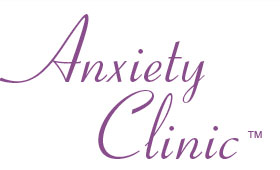Symptoms Of A Panic Attack
Panic attack symptoms can be incredibly distressing and are subject to common searches on the internet. It is important to separate the signs of a panic attack (which entails the lead up) from the symptoms of a panic attack (which is what happens during the attack) and is what we'll discuss in specific detail on this page.
If you've already done your research and are now ready to recover, our page on Panic Attack Treatment should help you decide on the best course of action to take. Alternatively, if you'd prefer to discuss your case directly with a Consultant you can contact us on 01782 855585, 11am to 9pm, seven days a week. We are happy to answer your questions, explain how we work and discuss your recovery options free and without obligation.
What Are The Most Common Symptoms Of A Panic Attack?

The first and perhaps most overlooked symptom of a panic attack is its seemingly random nature. A panic attack can happen at any time, in any situation and in any location - even when you're asleep. This can be confusing for many sufferers as it is human instinct to attempt to associate the cause of the panic attack with some form of 'trigger' - often a place or situation. However, panic attacks are NOT triggered this way as you'll learn if you look at our pages explaining: What Is A Panic Attack and What Causes Panic Attacks
Physical symptoms of panic attacks include:
- Irregular heartbeat (palpitations)
- Shortness of breath, difficulty breathing or hyperventilation
- Temperature shifts - hot flushes, sweating, chills, shivering...
- Physical shaking
- Balance disorientation
- Pins and needles in the hands and fingers
- Dry mouth, difficulty swallowing and uncommonly a feeling of choking
- Feeling faint, dizzy or nauseous
- Loss of sensation in the extremities / numbness
- Tightening of the chest, chest pain, abdominal discomfort
Psychological symptoms of panic attacks include:
- Ringing in the ears or white noise
- Rapid chatter in the mind, often in a frantic anxious tonality.
- Cycling thoughts regarding how to escape from the situation or conceal the panic attack
- Relentless waves of fear
- Altered perception, tuning out of reality and feeling dissociated (as though not in your own body)
If you can relate to more than even a few of the above symptoms - you almost certainly already have a problem with panic attacks. We're probably only confirming what you already expected... but what can you do about it in terms of helping yourself?
What Is The Best Way To Deal With Panic Attack Symptoms?

Let's start by looking at this from a different angle by instead asking what the worst possible course of action is with regard to dealing with panic attack symptoms.
The worst course is trying to suppress or distract yourself away from the symptoms in order to avoid a looming or existing panic attack. Unfortunately this is precisely the way most people instinctively try to deal with them.
This strategy is like closing the stable door after the horse has bolted. Of course, in an ideal world, the best course of action is to ensure the stable door is securely closed before the horse gets out. This is true of dealing with panic attacks too.
If you're already experiencing the signs or symptoms of a panic attack it's already too late to do anything genuinely useful to prevent it. Sure you can try to distract yourself, stall it or suppress it - but it's going to come sooner or later regardless of how much you wish otherwise. That's just the way panic attacks work.
The only genuine way to get rid of panic attacks is to deal with the underlying cause and stop them at the source. You'll read elsewhere on this website how panic attacks are a healthy response to unhealthy levels of stored stress and anxiety. Thus panic attacks are actually an inbuilt solution to excessive emotional pressure and contrary to what you may think of them, they are not a problem in themselves. The real problem, if you are a panic attack sufferer, is that your strategies for dealing with stress and anxiety are not working for you. If you keep running the same cycle of dealing with things using stress and anxiety - your brain will continue to use panic attacks to vent any dangerous excess pressure.
You can either continue living your life without making changes to the way you deal with things and put up with panic attacks as being an automated response to undo the problems you create - OR - you can, with our help, learn to deal with things differently so that you don't get excessively stressed or anxious and your brain will no longer need to resort to panic attacks. That's just the way it works. You're not broken or faulty - you've just gradually become your own worst enemy in terms of the way you deal with things in terms of anxiety and stress. This isn't about us passing judgement on you because we know you didn't choose to have panic attacks - however now you understand how the process works... it is up to you to take responsibility.
The panic attacks are there to let you know, in no uncertain terms, that you are not built to work long term with the emotional pressures you have become accustomed to putting on yourself. The panic attacks will not change or go away until you accept responsibility and address the underlying cause.
The great news is that we can help you sort this out, simply and quickly. In fact, treatment and recovery from panic attacks is far less hassle than keeping them! It's entirely your choice.
What Is The Best Treatment To Recover From Panic Attacks?

Many clients we work with initially claim "I'm an anxious person" or "I can't help being anxious" or "the anxious thoughts and feelings just overwhelm me and there's nothing I can do". Yet, within a couple of sessions they're no longer 'anxious people'. The reason is that there is no such thing as an anxious person - only a normal person that repeatedly uses a coping strategy that doesn't serve them.
The reason normal people use unhelpful coping strategies is that they often have no alternative options. Others have simply fallen into the routine of doing things in a certain way and have created a habit they can't get out of. Either way, we can teach you how to quickly break the old stress and anxiety habits as well as giving you several alternative options in terms of the way you deal with 'problems' in the future.
The truth is that both stress and anxiety are created internally by our thought processes and thus their levels can be changed by making slight alterations to the way we think. Human thought process shares much in common with computer software and can be rewritten by an expert just as easily. This is what we do at the Anxiety Clinic - we work with the software of the mind. Once you learn how to control your own thought processes it is easy to keep your stress and anxiety in check and well below the levels that would cause a panic attack.
The tools, technology and help are already available. The only thing currently missing is you taking decisive action to connect with those things. With this in mind here are your options:
I'd like to find out more on Panic Attack Treatment
I'd like to find out more about Face To Face Consultations at the Anxiety Clinic (Stoke on Trent)
I'd like to find out more about Telephone / Online Consultations (UK Only)




